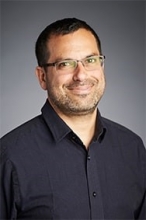CBE Seminar: Bioelectronics with Nanocarbons: from Organ-on-E-Chip to Fuzzy Interfaces

Department of Biomedical Engineering
Department of Materials Science and Engineering
Carnegie Mellon University, Pittsburgh, PA
Abstract: My research team efforts focus on developing a new class of nanoscale materials and novel strategies for the investigation of biological entities at multiple length scales, from the molecular level to complex cellular networks.
The first part of the talk will be dedicated to our current efforts to target the limits of electrophysiological studies of organoids, namely, direct, multisite, simultaneous investigation of tissues in three dimensions. We developed a breakthrough bioelectrical interface using 3D self-rolled biosensor arrays (3D-SR-BAs) of either active field effect transistors or passive microelectrodes to investigate human cardiac spheroids in 3D. The arrays provide continuous and stable multiplexed recordings of field potentials with high sensitivity and spatio-temporal resolution. Our approach enables electrophysiological investigation and monitoring of the complex signal transduction in 3D cellular assemblies towards an organ-on-an-electronic-chip (organ-on-e-chip) platform for tissue maturation investigations and development of drugs for disease treatment, such as arrhythmias.
In the second part of the talk, I will discuss the formation and use of complex hybrid-nanomaterials with tailored optical and electrical properties in biosensing and bioelectronics. Our highly flexible bottom-up nanomaterials synthesis capabilities allow us to form unique hybrid-nanomaterials, such as a one-dimensional nanowire (NW) and two dimensional graphene flakes grown out-of-plane with tailor-made physical properties. This new hybrid-nanomaterial enables minimally invasive, remote and non-genetic light-induced control of targeted cell activity with high spatial-temporal resolution. Photostimulation using NW-templated 3D fuzzy graphene (NT-3DFG) is highly flexible due to its broadband absorption. Moreover, NT-3DFG does not induce cellular stress with and without laser illumination. The non-genetic NT-3DFG platform adds a powerful toolset for basic scientists studying cell signaling within and between tissues using light to control cell activity. In summary, the exceptional synthetic control and flexible assembly of nanomaterials provide powerful tools for fundamental studies and applications in life science and open up the potential to seamlessly merge either nanomaterials-based platforms or unique nanosensor geometries and topologies with cells, fusing nonliving and living systems together.
Bio: Tzahi Cohen-Karni is an associate professor in the departments of biomedical engineering and materials science engineering at Carnegie Mellon University. He received both his B.Sc. degree in materials engineering and the B.A. degree in chemistry from the Technion Israel Institute of Technology, Haifa, Israel, in 2004. He received his master's of science degree in chemistry from Weizmann Institute of Science, Rehovot, Israel, in 2006, and his Ph.D. in applied physics from the School of Engineering and Applied Sciences at Harvard University, in 2011. He was a Juvenile Diabetes Research Foundation (JDRF) postdoctoral fellow at the Massachusetts Institute of Technology and Boston Children’s Hospital, in the labs of Robert Langer and Daniel S. Kohane from 2011 to 2013. Cohen-Karni received the 2012 International Union of Pure and Applied Chemistry Young Chemist Award and the 2014 Charles E. Kaufman Foundation Young Investigator Research Award. In 2016, he was awarded the NSF CAREER Award; in 2017, he was awarded the Cellular and Molecular Bioengineering Rising Star Award, the Office of Naval Research Young Investigator Award and the George Tallman Ladd Research Award. In 2018, Cohen-Karni was awarded the Cellular and Molecular Bioengineering Young Innovator Award, and in 2019, he won the Carnegie Institute of Technology (CIT) Dean’s Early Career Fellowship.
Host: Alon Gorodetsky
Share
Upcoming Events
-
MSE 298 Seminar: Radiation Resistance and Mechanical Response of Ceramics in Extreme Environments
-
EECS 294 Seminar: Programming Light Diffraction for Information Processing and Computational Imaging
-
MAE 298 SEMINAR: Stretchable Electronics for Soft Biological and Robotic Systems
-
CBE Distinguished Lecture/CBE 298 Seminar: Computational Design of Peptides as Detectors, Sensors and Drugs
-
MSE 298 Seminar: Molecular Modeling in the Age of AI - From Energy Materials to Device Simulations
